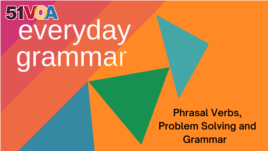02 September 2021
This report represents the 300th Everyday Grammar program. In celebration of the event, we will explore common phrasal verbs that have to do with the development of Everyday Grammar reports.
What you learn will be useful for discussing any kind of planning or problem solving.
Let's begin with a few important terms and ideas.

What are phrasal verbs?
Phrasal verbs are groups of words that have a verb and another short word or words. Together, these word groups take on a meaning that is different from what the individual words suggest.
For example, consider the phrasal verb go on. The verb go is followed by the short word on. Together these words can mean to happen or take place.*
Some common phrasal verbs describe how VOA Learning English develops each week's Everyday Grammar report. These phrases are useful for describing planning and problem solving in general.
Let's explore each of these phrasal verbs.
Step 1 – Figure out
The first step in every week's report involves the phrasal verb figure out. The writer figures out – or develops an understanding of – a subject. Reader questions, news reports, grammar books and friendly suggestions all play a part in the development of Everyday Grammar reports.
The phrasal verb figure out even appears at our meetings, as in:
"Have you figured out an Everyday Grammar topic for next week?"
Step 2 – Work out
The second step in every program involves the writer working out the idea for the story. In this case, the phrasal verb work out means to plan or think carefully about the story in detail.
For example, the writer might need to work out a way to include some fun audio examples from movies, songs or news reports. Or, the writer might need to work out a way to explain a complex grammar subject in a clear way.
Step 3 – Go ahead
After working out a plan for the report, the third step is to go ahead with the report. Go ahead means to carry out an action.
For example, after discussing ideas and plans for a story, a VOA worker at a meeting might say, "You should go ahead with that story!"
Step 4 - Look back
After the report is published, the writer looks back at the report and reader comments. The phrasal verb look back means to think of something again or to reconsider something after a period of time.
This is an important step for understanding the strengths and weaknesses of the report. This step also helps the writers develop new ideas for future reports.
Closing thoughts
While today's report explored the steps taken for Everyday Grammar programs, the phrasal verbs you learned about are useful to describe all kinds of problem-solving activities.
A person might, for example, figure out the size of a problem, work out a plan to deal with it, go ahead with a plan to solve the problem and finally look back at what he or she has done.
I'm John Russell.
John Russell wrote this story for VOA Learning English. Mario Ritter, Jr. was the editor.
* go on can take on other meanings
_____________________________________________________________
Words in This Story
grammar -- n. the whole system or structure of a language
topic -- n. someone or something that people talk or write about